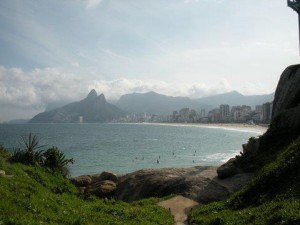
The referenced media source is missing and needs to be re-embedded.
By Colleen Meehan, Pennsylvania Program Organizer
In late June I had the opportunity to travel to Rio de Janeiro, Brazil to take part in the Peoples Summit for Social and Environmental Justice, and to attend several events at the United Nations Earth Summit. The UN “Rio+20” Earth Summit joined together governments and nongovernmental organizations to discuss sustainable development measures to meet future needs of our countries, and to form a global plan of action. The Peoples Summit was more focused on what we as citizens of these states can do to combat environmental destruction, such as building grassroots movements and taking action to participate in the democratic process.
The Peoples Summit brought together activists, organizers, scientists, lawyers, academics and students from all over the world to focus the attention on the environment. People from all different walks of life came together in Rio because we felt that governments are ignoring the needs of their people and failing to protect the natural resources that we all, as human beings, need to survive. The widespread diversity of the Peoples Summit was in stark contrast to a general lack of access for people of different backgrounds at UN sponsored official and semi-official events. The stories I heard in Rio were eye opening, specifically those highlighting how resource extraction industries and deforestation have had such an impact on so many communities. I felt a sense of urgency among the people for the need for drastic change to begin now, as it is our only hope in creating a sustaining Earth for future generations.
It was a heartening sight to see participation from so many indigenous members and leaders. I am especially inspired by how well organized these indigenous groups are as tribes from all over South America joined together. Indigenous groups came in caravans to Rio to attend the Kari-Oca II conference (the first one was in 1992 alongside the original Earth Summit), the Peoples Summit and few were invited to the UN Earth Summit. These are some of the most vulnerable populations facing environmental degradation today as they live directly off the land. Many indigenous tribes are feeling the harsh reactions to climate change and are experiencing the ever present risks and scarcities for clean water, food and fertile land.
During one workshop that really stuck out to me an indigenous woman and tribal leader from the Philippines spoke of her tribe’s dependence on their land and its resources. She told the story of her tribe’s experiences of trying to fend off a Canadian mining company from coming into her village. It was a life or death situation for them because, as she explained, they do not have anything other than their land and its resources to live off. She described their desperate attempts while defending their land from the miners, “We have nothing else to live for so we throw up our hands and lives.”Related Posts
Stay Informed
Get the latest updates and actions:
Thanks for signing up!
There was a problem processing your signup. Please try again.


